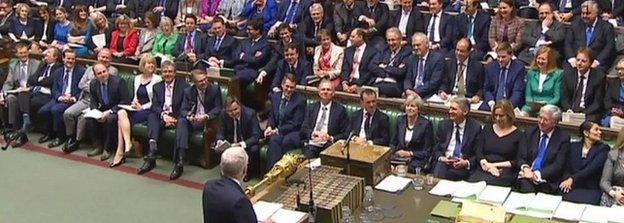PMQs: May and Corbyn set out election 'choices'
- Published
- comments
The Labour leader addressed a series of questions from members of the public to the prime minister
Theresa May and Jeremy Corbyn clashed over the "choice" facing voters in the final PMQs before the general election.
The PM claimed a win for Labour would mean a "chaotic Brexit" but Mr Corbyn said the Tories were "strong against the weak and weak against the strong".
Mrs May also declined to confirm the so-called triple lock on the state pensions would be kept in place.
The SNP's Angus Robertson, who raised the issue, said the PM's answers showed she planned to "ditch" the commitment.
The triple lock, which has been in place since 2010, guarantees that pensions rise by the same as average earnings, the consumer price index, or 2.5%, whichever is the highest.
With a general election looming on 8 June, the exchange could have been the last between Mrs May and Mr Corbyn. And it is thought to have been the longest on record, lasting for about 58 minutes, as Commons Speaker John Bercow allowed MPs stepping down at the election to ask questions.
In other election developments:
Former Lib Dem MP David Ward is sacked as a candidate over past comments about Israel
Jeremy Corbyn says he won't do TV election debates without Theresa May
Zac Goldsmith and Esther McVey are selected by the Tories to fight Richmond Park and Tatton seats
The prime minister holds talks with EU's chief Brexit negotiator Michel Barnier in Downing Street
Labour promises a pay rise for NHS staff and no tuition fees for student nurses
UKIP councillor John Bray is chosen to contest Clacton after earlier nearly abandoning his bid over a Twitter row
Mr Corbyn opted to read out questions from members of the public, about low wages, house prices, school spending and the NHS, reverting to an approach he used regularly in his first months as leader.
Millions of people were struggling to "make ends meet" following seven years of austerity, he claimed, while lack of investment in housing had led to the lowest levels of house building for 90 years.
"The election on 8 June is a choice...between a Conservative government for the few and a Labour government that will stand up for all of our people," he said.
The PM defended the government's record and repeatedly said the Conservatives offered "strong and stable" leadership.

Analysis

By BBC political editor Laura Kuenssberg
Prime Minister's Questions today was brutal, noisy, and obvious.
Obvious in that the Tories are going to spend as many days as they can of this campaign trying to compare Theresa May to Jeremy Corbyn. They want it to be personal.
It's been early days, but there's not much evidence so far to suggest the Tories will go much further in this campaign than to say "don't trust him, trust her".
Labour's not going to publish its manifesto for another couple of weeks. They believe their policies could be popular, which would help to combat some of the perceptions of Jeremy Corbyn. But they have to act fast if they want this election to be much more than a referendum on Jeremy Corbyn versus Theresa May.

She contrasted this with what she said was her opponent's "refusal to say he would strike against terrorism, to commit to our nuclear deterrent and to control our borders".
Angus Robertson: "Will the PM give a clear and unambiguous commitment to maintaining the triple lock on the state pension?"
Tim Farron: "20 years ago she berated the Conservative Party for being the nasty party, but her party has never been nastier"
The prime minister stuck relentlessly to her "strong and stable" slogan
"Every vote for him is a vote to weaken our economy. Every vote for me is a vote for a strong economy with the benefits felt by everyone across the country," she said.
Responding to Mr Robertson's question about pensions, Mrs May declined to give a guarantee over future spending but insisted "pensioner incomes" would continue to increase under the Conservatives.
The SNP MP said the prime minister had failed to answer a "simple question", adding that "the only reason they will not guarantee it is because they want to cut pensions".
Labour has pledged to retain the triple lock, although the policy has been criticised by MPs as being financially "unsustainable" and an independent review last year said it should be reconsidered.
Lib Dem leader Tim Farron used his question to criticise both the two main parties, claiming the Conservatives "had "never been nastier" while Labour was the most incompetent opposition in history.
In his first intervention of the election campaign, Foreign Secretary Boris Johnson said the UK needed strong leadership in "uncertain and unstable times" and a "serious and clear-sighted" approach to global challenges.
Addressing foreign diplomats in a speech at the Mansion House in central London, he highlighted Theresa May's support for the renewal of the UK's nuclear weapons system and her determination to place a strong transatlantic alliance at the "bedrock of global security".